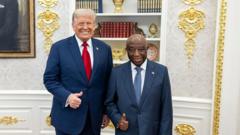In the wake of President Trump's recent comments praising Liberian President Joseph Boakai for his "good English," it is essential to delve into the historical context between the two nations. Here are six key insights into Liberia's unique heritage and its longstanding American connections:
**Understanding Liberia: Six Historical Insights Following Trump's Praise for President Boakai**

**Understanding Liberia: Six Historical Insights Following Trump's Praise for President Boakai**
In a recent remark, President Trump lauded Liberian President Joseph Boakai for his English skills, inadvertently highlighting Liberia's deep-rooted ties to the United States. This article enumerates six crucial aspects of Liberia's rich history and cultural connection to America.
1. **Foundation by Freed Slaves**
Liberia's roots trace back to 1822 when it was established by freed African-American slaves. The nation gained independence in 1847, with Abraham Lincoln officially recognizing it in 1862. This historical backdrop has significantly shaped Liberia’s cultural identity, seen in the influence it retains from African-American traditions. The descendants of these freed slaves, called Americo-Liberians, held power for over a century, which occasionally led to tensions with indigenous populations.
2. **Capital Named After a U.S. President**
Monrovia, Liberia's capital, pays homage to James Monroe, the fifth president of the United States, who championed the resettlement of freed slaves through the American Colonization Society. The city reflects American architectural styles and has streets named after American figures, emphasizing its origins.
3. **Flag Similarities**
The resemblance between the Liberian and American flags is striking. Liberia's flag, featuring 11 stripes and a white star representing its status as Africa's first independent republic, was designed by seven American-born women. This tribute underscores the deep interconnections between the nations.
4. **Athletic Achievements Bridging Two Nations**
Timothy Weah, son of former President George Weah, is a professional football player representing the U.S. national team and playing for Juventus. This dual-heritage story illustrates the ongoing cultural blend between Liberia and America.
5. **A Nobel Laureate in Leadership**
Ellen Johnson Sirleaf, Africa’s first elected female president, led Liberia from 2006 to 2018. A graduate of Harvard University, she garnered global accolades for her work in peace and women's rights, including the Nobel Peace Prize in 2011, showcasing Liberia's prominence on the continent.
6. **A Major Rubber Producer**
Firestone Liberia, the world's largest rubber plantation, has historical ties to U.S. business interests since its founding in 1926. While it employs thousands locally, the company faces criticisms regarding workers' rights and conditions, highlighting ongoing socio-economic challenges within the industry.
Following Trump's comments, reactions among Liberians varied. While some praised the compliment, others emphasized the need for better awareness of the country's educational legacy. Foreign Minister Sara Beysolow Nyanti noted that Trump's remarks indicated a global misunderstanding of Africa's multilingual landscape, especially Liberia’s unique English accent, which can often resemble American intonations.
In sum, understanding Liberia's rich history, its American roots, and the contemporary experiences of its people offers a nuanced perspective on the current dialogue between the two nations.
Liberia's roots trace back to 1822 when it was established by freed African-American slaves. The nation gained independence in 1847, with Abraham Lincoln officially recognizing it in 1862. This historical backdrop has significantly shaped Liberia’s cultural identity, seen in the influence it retains from African-American traditions. The descendants of these freed slaves, called Americo-Liberians, held power for over a century, which occasionally led to tensions with indigenous populations.
2. **Capital Named After a U.S. President**
Monrovia, Liberia's capital, pays homage to James Monroe, the fifth president of the United States, who championed the resettlement of freed slaves through the American Colonization Society. The city reflects American architectural styles and has streets named after American figures, emphasizing its origins.
3. **Flag Similarities**
The resemblance between the Liberian and American flags is striking. Liberia's flag, featuring 11 stripes and a white star representing its status as Africa's first independent republic, was designed by seven American-born women. This tribute underscores the deep interconnections between the nations.
4. **Athletic Achievements Bridging Two Nations**
Timothy Weah, son of former President George Weah, is a professional football player representing the U.S. national team and playing for Juventus. This dual-heritage story illustrates the ongoing cultural blend between Liberia and America.
5. **A Nobel Laureate in Leadership**
Ellen Johnson Sirleaf, Africa’s first elected female president, led Liberia from 2006 to 2018. A graduate of Harvard University, she garnered global accolades for her work in peace and women's rights, including the Nobel Peace Prize in 2011, showcasing Liberia's prominence on the continent.
6. **A Major Rubber Producer**
Firestone Liberia, the world's largest rubber plantation, has historical ties to U.S. business interests since its founding in 1926. While it employs thousands locally, the company faces criticisms regarding workers' rights and conditions, highlighting ongoing socio-economic challenges within the industry.
Following Trump's comments, reactions among Liberians varied. While some praised the compliment, others emphasized the need for better awareness of the country's educational legacy. Foreign Minister Sara Beysolow Nyanti noted that Trump's remarks indicated a global misunderstanding of Africa's multilingual landscape, especially Liberia’s unique English accent, which can often resemble American intonations.
In sum, understanding Liberia's rich history, its American roots, and the contemporary experiences of its people offers a nuanced perspective on the current dialogue between the two nations.


















